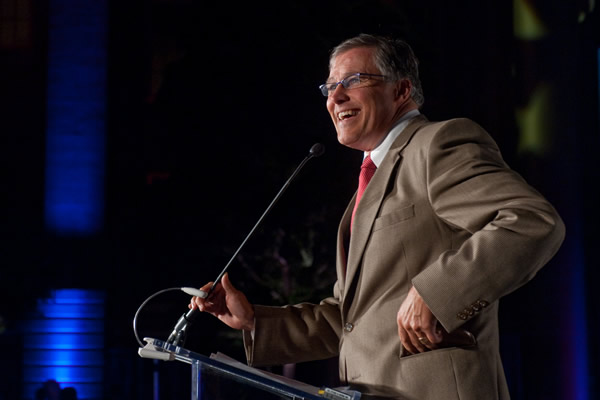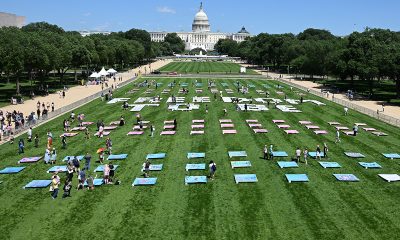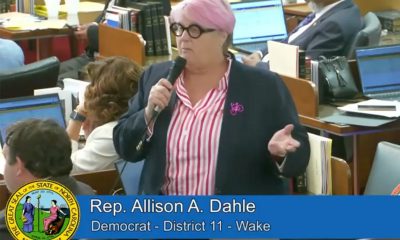National
Washington State reinstitutes N.C. travel ban after HB2 deal
Replacement criticized for barring city non-discrimination ordinances


Washington Gov. Jay Inslee reinstated a travel ban to North Carolina.
Washington State has reinstated its ban on state-sponsored travel to North Carolina — first enacted over anti-LGBT House Bill 2 — in the aftermath of the imposition of a new replacement law civil rights groups say is still discriminatory.
Washington Gov. Jay Inslee issued a memo on Thursday putting in place a new ban on state-funded travel to North Carolina after his previous ban expired when North Carolina Gov. Roy Cooper, a Democrat, signed the new measure.
In the memo, Inslee says, like HB2, the new law, labeled House Bill 142, “contains similar troubling, discriminatory provisions and Washingtonians traveling to North Carolina on work-related matters may still experience discrimination.”
“And though North Carolina formally replaced HB2, the continued allowance of discrimination is inherent in the spirit [of] HB142,” Inslee continues. “Consequently, I again order that no executive or small-cabinet agency shall allow publicly funded non-essential travel to North Carolina.”
The new law prohibits prohibits municipalities, state agencies and the University of North Carolina from the “regulation of access” to bathrooms, locker rooms and showers without the legislature’s permission. It also bans municipalities from enacting LGBT-inclusive nondiscrimination measures that would apply to private employment or public accommodations until 2020.
Much to the consternation of LGBT rights supporters, Cooper, a Democrat, the law after closed-door negotiations with Republican leaders of the state legislature. Their agreement was intended to alleviate economic boycott to the state as a result of HB2 in time for a deadline set by the National Collegiate Athletic Association to either repeal the law or lose championship games for years to come. The NCAA later announced the new law was “minimally” acceptable to again consider championships in North Carolina.
Washington is the third state to declare its travel ban enacted over HB2 will remain in place in the aftermath of Cooper signing the replacement law. Other states that have similarly reaffirmed their bans are California and Minnesota.
Unlike California and Minnesota, Inslee’s earlier ban expired before he reinstated it because the first measure had language keeping it in place “so long as the recently approved HB2 exists in its current form,” which wasn’t the case after Cooper signed the replacement deal.
The remaining states that enacted travel bans over HB2 — Vermont, Connecticut and New York — haven’t yet declared the status of those policies with the new North Carolina law in place.
Municipalities that have declared they’ll keep their travel bans to North Carolina in place are Chicago; New York City; Washington, D.C.; San Francisco; Seattle; Portland, Ore.; Atlanta; Baltimore; Los Angeles; Oakland; Santa Fe; Cincinnati; Salt Lake City; Palm Springs, Calif.; West Palm Beach; Portland, Maine; Burlington, Vt; and Wilton Manors, Fla.
The White House
Hundreds protest ICE killing of Renee Nicole Good in D.C.
Married queer woman shot in Minneapolis on Wednesday

Hundreds of people took to the streets of D. C. on Thursday night to protest the killing of a U.S. citizen by a U.S. Immigration and Customs Enforcement agent.
Protests began at the busy — and increasingly queer — intersection of 14th and U Streets, N.W. There, hundreds of people held signs, shouted, and made their way to the White House to voice their dissent over the Trump-Vance administration’s choice to increase law enforcement presence across the country.
The protest, which also occurred simultaneously in cities large and small across the country, comes in the wake of the death of Minneapolis resident Renne Nicole Good at the hands of ICE Agent Jonathan Ross. Good left behind two children and a wife, Rebecca Good.
Records obtained by the Associated Press found that Ross was an Iraq War veteran and nearly two decades into his career with U.S. Border Patrol and ICE.
Good was gunned down just blocks away from where George Floyd was killed by police in 2020, sparking weeks of national protests. Minnesota officials say the FBI has blocked their access to an investigation into the fatal shooting, according to a BBC story published on Friday.
In the nation’s capital, protesters marched from the intersection of 14th and U Street to Lafayette Square, right outside the White House. Multiple D.C. organizations led the protest, most notably Free DC, a nonprofit that works to ensure the right of “self-determination” for District residents, as many local laws can be reviewed, modified, or overturned by Congress. Free DC had organized multiple protests since the Trump-Vance administration was elected.
The Washington Blade spoke to multiple protesters towards the tail end of the protest about why they came out.
Franco Molinari, from Woodbridge, Va., crossed the Potomac to partake in his first-ever protest.
“I don’t appreciate ICE and the use of federal agents being pretty much militarized against America,” Molinari said while holding a “Justice for Renee” sign. “The video of Renee being executed cartel style in her car was enough for me to want to come out, to at least do something.”
Molinari, like many others the Blade spoke with, found out about the protest on Instagram.
“It was my friend there, Sarah … had sent a link regarding the protest to a group chat. I saw it in the morning, and I thought, ‘You know what, after work, I’m head out.’”
He also shared why protesting at the White House was important.
“I already saw the response that the president gave towards the murder of Renee, and it was largely very antagonizing,” Molinari said.
President Donald Trump, along with federal leaders under him, claimed that Good “violently, willfully and viciously ran over the ICE officer.” The president’s claims have been widely discredited through multiple videos of the incident, which show Good was attempting to leave the scene rather than attacking the officer.
“I hope that anybody would be able to see that and see the response and see for themselves that it just is not correct,” Molinari said.
The Blade also spoke with leftist influencer Dave the Viking, who has more than 52,000 followers on TikTok, where he posts anti-fascist and anti-Trump videos.
“We’re out here to make sure that this regime can’t rewrite history in real time, because we all know what we saw … we’re not going to allow them to run with this narrative that they [ICE agents] were stuck in the snow and that that poor woman tried to weaponize her car, because we all saw video footage that proves otherwise,” he told the Blade. “We’re not going to let this regime, the media, or right-wing influencers try to rewrite history in real time and try to convince us we didn’t all see what we know we saw.”
Dave the Viking continued, saying he believes the perceived power of ICE and other law enforcement to act — oftentimes in deadly and unjustifiable ways — is a product of the Trump-Vance administration.
“There’s a line between fascism and anti-fascism. These motherfuckers have been pushing that envelope, trying to label an idea a terrorist organization, to the point of yesterday, crossing that line hardcore. You face the point of looking at history and saying there was this 1989, 2003 America, where we’re just going in, raiding resources. Where is this fucking 1930s Germany, where we’re going in and we’re about to just start clearing shit and pulling knots? Yeah, nope. We proved that shit yesterday.”
Two people were injured in another shooting involving federal agents, this time Border Patrol in Portland, Ore., on Thursday afternoon.
KC Lynch, who lives near American University, also spoke about her choice to protest with a group.
“I came out today because everything that ICE has done is absolutely unacceptable, not only killing this one woman, but also the fact that they’ve been imprisoning people in places that are literally, that have been literally on record by international organizations shown to be human rights violating. It’s unbelievably evil.”
Lynch also echoed Dave’s opinion about parallels between the Trump-Vance administration and the rise of Adolf Hitler in Nazi Germany.
“It’s literally what happened before the Holocaust. We should all be scared. We should all be angry. I’m so angry about it … even talking about it — I’m sorry,” she said before getting choked up.
Lynch emphasized that despite the circumstances in which people were protesting together, the sense of community was strong and powerful.
“I feel like it’s important for people to know that we’re angry, even if no policy changes come out of it, and it’s just nice to yell and be angry about it, because I feel like we’ve probably all been feeling this way, and it’s nice to be around people that are like minded and to like have a sense of community.”
Minnesota
Reports say woman killed by ICE was part of LGBTQ community
Renee Nicole Good shot in Minneapolis on Wednesday

A U.S. Immigration and Customs Enforcement agent shot and killed a woman in Minneapolis as she attempted to drive away from law enforcement during a protest on Wednesday.
The Star Tribune newspaper identified the victim as Renee Nicole Good, 37, a Minneapolis resident who lived blocks from where she was shot in the Central neighborhood, according to reports. Donna Ganger, Good’s mother, told the Star Tribune that her daughter lived in the Twin Cities with her wife.
Multiple videos of the shooting have gone viral on social media, showing various angles of the fatal incident — including footage that shows Good getting into her car and attempting to drive away from law enforcement officers, who had their weapons drawn.
In the videos, ICE agents can be heard telling Good to “get out of the fucking car” as they attempted to arrest her. Good, who press reports say was married to a woman, ended up crashing her car into an electric pole and other vehicles. She was later transported from the scene of the shooting and died at the hospital.
President Donald Trump defended the ICE agent on Truth Social, saying the officer was “viciously” run over — a claim that coincides with Homeland Security Secretary Kristi Noem’s assessment of the situation. Noem, a South Dakota Republican, insisted the officer “fired defensive shots” at Good after she attempted to run over law enforcement agents “in an attempt to kill them — an act of domestic terrorism.”
Multiple state and local officials disputed claims that the shooting was carried out in self-defense at the same time Noem was making those assertions.
An Instagram account that appears to belong to Good describes her as a “poet and writer and wife and mom and shitty guitar strummer from Colorado; experiencing Minneapolis, MN,” accompanied by a rainbow flag emoji.
A video posted to X after the shooting shows a woman, reportedly her wife, sitting on the ground, crying and saying, “They killed my wife. I don’t know what to do.”
“We’ve dreaded this moment since the early stages of this ICE presence in Minneapolis,” Mayor Jacob Frey said during a Wednesday press conference. “Having seen the video myself, I want to tell everybody directly that [the DHS’s claim of self-defense] is bullshit. This was an agent recklessly using power that resulted in somebody dying, getting killed.”
“I have a message for ICE. To ICE, get the fuck out of Minneapolis,” Frey continued. “We do not want you here. Your stated reason for being in this city is to create some kind of safety, and you are doing exactly the opposite. People are being hurt. Families are being ripped apart. Long-term Minneapolis residents that have contributed so greatly to our city, to our culture, to our economy are being terrorized, and now somebody is dead. That’s on you, and it’s also on you to leave.”
Across the Capitol, members of the House and the Senate condemned the actions of the officer.
“There’s no indication she’s a protester, there’s nothing that at least you can see on the video, and therefore nothing that the officers on the ground could see that identify her as someone who’s set out to try to do harm to an ICE officer,” U.S. Sen. Elizabeth Warren (D-Mass.) said Wednesday night on MS NOW’s “The Weeknight.”
“There is no evidence that has been presented to justify this killing,” House Minority Leader Hakeem Jeffries (D-N.Y.) said in a statement on his website. “The masked ICE agent who pulled the trigger should be criminally investigated to the full extent of the law for acting with depraved indifference to human life.”
“ICE just killed someone in Minneapolis,” U.S. Rep. Robert Garcia (D-Calif.) the highest-ranking Democrat on the House Oversight Committee, posted on X. “This administration’s violence against communities across our country is horrific and dangerous. Oversight Democrats are demanding answers on what happened today. We need an investigation immediately.”
In a statement to the Advocate, Human Rights Campaign President Kelley Robinson wrote, “Today, a woman was senselessly killed in Minneapolis during an ICE action — a brutal reminder that this agency and the Trump regime put every community at risk, spreading fear instead of safety. Reports that she may have been part of the LGBTQ+ community underscore how often the most vulnerable pay the highest price.”
National LGBTQ Task Force President Kierra Johnson also responded to Good’s death.
“We recognize and mourn the loss of Renee Nicole Good and extend our condolences to her family, loved ones, and community,” said Johnson in a statement. “This loss of life was preventable and reprehensible, particularly coming at the hands of federal agents.”
National
U.S. in midst of ‘genocidal process against trans people’: study
Attacks rooted in Nazi ideology’s views on gender

Earlier this week, the Lemkin Institute for Genocide Prevention and Human Security issued a haunting warning. Dr. Elisa von Joeden-Forgey, president of the Lemkin Institute, stated that the U.S. is in the “early-to-mid stages of a genocidal process against trans and nonbinary and intersex people.” Dr. Gregory Santon, former president of the International Association of Genocide Scholars, flags “a hardening of categories” surrounding gender in a “totalitarian” way.
Stanton argues that this is rooted in Nazi ideology’s surrounding gender — this same regime that killed many LGBTQIA individuals in the name of a natural “binary.” As Von Joeden-Forgey said, the queer community, alongside other “minority groups, tends to be a kind of canary in the coal mine.”
In his first year in office, Trump and his Cabinet’s anti-trans rhetoric has only intensified, with a report released late September by journalist Ken Klippenstein in which national security officers leaked that the FBI is planning to classify trans people as “extremists.” By classifying trans people as “Nihilistic Violent Extremists,” far-right groups would have more “political (and media) cover,” as Abby Monteil reports for them, for anti-trans violence and legislation.
While the news is terrifying, it’s not unprecedented – the fight against trans rights and classification of trans people as violent extremists was included in Project 2025, and in the past several weeks, far-right leaders’ transphobic campaign has expanded: boycotting Netflix to pressure the platform to remove trans characters, leveraging anti-trans attack ads in the Virginia governor’s race and banning professors from acknowledging that trans people exist. In fact last month, two Republican members of Congress called for the institutionalization of trans people.
It’s a dangerous escalation of transphobic violence that the Human Rights Campaign has classified as an epidemic. According to an Everytown for Gun Safety report published in 2020, the number of trans people murdered in the U.S. almost doubled between 2017 and 2021. According to data released by the Gun Safety report from February 2024, 34 percent of gun homicides of trans, nonbinary, and gender expansive people remain unsolved.
As Tori Cooper, director of Community Engagement for the Transgender Justice Initiative for the Human Rights Campaign Foundation, this violence serves a purpose. “The hate toward transgender and gender expansive community members is fueled by disinformation, rhetoric and ideology that treats our community as political pawns ignoring the fact that we reserve the opportunity to live our lives full without fear of harm or death,” Cooper said.
“The genocidal process,” Von Joeden-Forgey said, “is really about destroying identities, destroying groups through all sorts of means.” And just like the Nazi regime, former genocide researcher Haley Brown said, the Trump administration is fueling conspiracy theories surrounding “cultural Marixsm” — the claim that leftists, feminists, Marxists, and queer people are trying to destroy western civilization. This term, Brown states, was borrowed directly from the Nazi’s conspiracies surrounding “Cultural Bolshevism.”
As Brown explains, historians are just beginning to research the Nazis’ anti-trans violence, but what they are finding reveals a terrifying pattern wherein trans people are stripped of their identification documents, arrested and assaulted, and outright killed.
Before World War II, Germany – especially Berlin – was a hub for transgender communities and culture. In 1919, Dr. Magnus Hirschfield, a Jewish gay sexologist and doctor, founded the Institut für Sexualwissenschaft, the Institute for Sexual Science. The Institute was groundbreaking for offering some of the first modern gender-affirming healthcare, with a trans-affirming clinic and performing some of the first gender-affirming surgeries in the 1930s for trans women Dora Richter and Lili Elbe.
Researchers at the institute coined the term “trassexualism” in 1923, which while outdated now, was the first modern term that Dr. Hirschfield used when working with Berlin police to acquire “transvestite passes” for his patients to help them avoid arrest under public nuisance and decency laws. During the Weimar Republic, trans people could also change their names although their options were limited. In Berlin, queer press flourished after World War I along with a number of clubs welcoming gay, lesbian and trans clientele, including Eldorado, which featured trans performers on stage.
But as Hitler rose to power, trans people were targeted. In 1933, Nazi youth and members of the Sturmabteilung ransacked the institute, stealing and burning books – one of the first book burnings of the Nazi regime. German police stopped recognizing the “transvestite” passes and issuing new ones, and under Paragraph 175, which criminalized sexual relationships with men, trans women (who were misgendered by the police) were arrested and sent to concentration camps.
As the Lemkin Intsitute for Genocide Prevention and Human Security wrote in a statement:
“The Nazis, like other genocidal groups, believed that national strength and existential
power could only be achieved through an imposition of a strict gender binary within the racially pure ‘national community.’ A fundamentalist gender binary was a key feature of Nazi racial politics and genocide.”
History professor Laurie Marhoefer wrote for The Conversation that while trans people were targeted, there was not extensive discussion of them by the regime. But there was evidence of the transphobia behind the regime’s violence, specifically in Hermann Ferdinand Voss’s 1938 book “Ein Beitrag zum Problem des Transvestitismus.”Voss noted that during the Nazi regime, trans people could and were arrested and sent to concentration camps where they underwent forced medical experimentation (including conversion therapy and castration) and died in the gas chambers.
While there is growing recognition that gay, bisexual, and lesbian individuals were targeted during the Holocaust, few know about the trans genocide through which trans individuals were arrested, underwent forced castration and conversion therapy, and were outright killed alongside gay, lesbian, disabled and Jewish individuals in concentration camps. Historians are just beginning to undertake this research, writes Marhoefer, and to delve further into the complex racial hierarchies that affected how trans people were treated.
As Zavier Nunn writes for Past & Present, trans people of “Aryan” racial status and those not considered to be homosexuals were sometimes spared from the worst violence and outright murder. Depending on their skills, they could even be considered for rehabilitation into the Volksgemeinschaft, or Nazi utopian community. As Nunn highlights, trans violence was much more nuanced and individualized and should be explored separately from violence against gay and lesbian individuals during the Holocaust.
Marhoefer’s research of violence against trans women, as recorded in police files (as is the persecution of gay and lesbian individuals), is groundbreaking but rare. He gave a talk at the Museum of Jewish Heritage in 2023, shortly after a 2022 civil lawsuit about denial that trans people were victims of the Holocaust. The German court recognized that trans people were victimized and killed by the Nazi regime, but in the United States, there is still a hesitancy by the wider LGBTQ community and leftist groups to acknowledge that we are living during a time of anti-trans violence, that trans people are being used as political scapegoats in order to distract from real problems of accountability and transparency around government policy.
As anti-trans legislation escalates, it’s important to remember and call out how trans violence is not only a feminist issue, it’s a human rights one as well. While Shannon Fyfe argues that the current campaigns against trans people may not fit the traditional legal definition of a genocide, the destruction and denial of life saving care, access to public spaces, and escalating violence is still immensely devastating.
Kaamya Sharma also notes that the term “genocide” has deep geo-political implications. As she explained, “western organisations are, historically and today, apathetic to the actual lives of people in the Global South, and put moral posturing above Brown and Black lives,” so the choice to use “genocide” is a loaded one. But as the Lemkin Institute for Genocide Prevention and Human Security writes in the same statement: “The ideological constructs of transgender women promoted by gender critical ideologues are particularly genocidal. They share many features in common with other, better known, genocidal ideologies. Transgender women are represented as stealth border crosses who seek to defile the purity of cisgender women, much as Tutsi women were viewed in Hutu Power ideology and Jewish men in Nazi antisemitism.”
Trans people are not extremists, nor are they grooming children or threatening the fabric of American identity – they are human beings for whom (like all of us) gender affirming care is lifesaving. As we remember the trans lives lost decades ago and those lost this year to transphobic violence, knowing this history is the only way to stop its rewriting.
-

 National5 days ago
National5 days agoWhat to watch for in 2026: midterms, Supreme Court, and more
-

 Opinions5 days ago
Opinions5 days agoA reminder that Jan. 6 was ‘textbook terrorism’
-

 Colombia5 days ago
Colombia5 days agoClaudia López criticizes Trump over threats against Colombian president
-

 District of Columbia4 days ago
District of Columbia4 days agoImperial Court of Washington drag group has ‘dissolved’




















